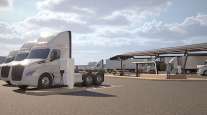Senior Reporter
BYD, Penske Join Task Force to Shape Charging Infrastructure

BYD America and Penske Truck Leasing separately announced they recently joined CharIN, a Berlin-based alliance that is leading a global effort to standardize electric-vehicle charging infrastructure.
BYD and Penske are part of CharIN’s new task force focused on high-power charging for commercial vehicles.
What is a CCS?
- Combines single-phase with fast 3-phase AC charging using alternating current of a maximum of 43 kilowatts.
- Provides fast high-power DC charging, up to 200 kW, then 350 kW in the future, within a single system.
- Includes the connector, the managing of control functions and the charging communication between electric vehicle and infrastructure.
- Is intended to cover all charging scenarios with a single product and will accommodate AC or DC systems.
“This is industry participants, truck makers, charging-system manufacturers, public utilities, truck stops that could serve as potential fueling stations, and us,” Bill Combs, director of connected fleet at Penske Truck Leasing, told Transport Topics, speaking of the task force.
Penske is the first fleet operator to join the commercial vehicle task force, chaired by a representative of Daimler Trucks North America. “We are hoping that this becomes a broader organization for fleets as well,” Combs said.
The task force next meets Sept. 18 in Detroit. Its initial meeting was in March.
The group should be considered as a path of least resistance for commercial adoption of this new technology, said Luke Zheng, director of project management for BYD America, a unit of BYD Motors Inc.
“Building a charging infrastructure cannot be done by just one manufacturer. It requires an array of components, that needs an ecosystem and an array of suppliers,” Zheng said.
CharIN is advocating for a global standard based on the Combined Charging System.
The communications between trucks and charging systems is vital, “to make sure we understand just what electricity is going into which truck at what time.”
“With varying utility rates, it is important to understand that type of thing — and understand miles-per-gallon equivalents, how will customers pay and how will utilities charge,” Combs said.
At the same time, there looms what occurred when the various models and makes of smartphones appeared, one on top of another, he said — most came with unique chargers.
There are two related automotive standards: the CHAdeMO standard developed by Japanese manufacturers and the GB/T standard mandated by the Chinese government for vehicles sold in China. Additionally, Tesla has its proprietary system for its vehicles, according to CharIN — as does BYD.
“It would greatly ease the burden of charging if there was a standard that the [truck makers] would follow. That would make it a lot easier for our [fleet] customers, and us,” Combs said.
He said he believes a commercial-vehicle charging standard will happen.

Penske is set to receive 10 eCascadias from DTNA for use in California and the Pacific Northwest. (Daimler Trucks North America)
“Whether or or not it is fully engaged with the standards bodies has yet to be determined. But it will be a step in the right direction,” he added.
In the meantime, Penske is scheduled to receive from DTNA 10 battery-electric eCascadias and 10 eM2s for use in California and the Pacific Northwest that are the first trucks in its Freightliner Electric Innovation Fleet.
In November 2017, Loblaw Cos., the largest Canadian food retailer, began testing BYD’s battery-electric Class 8 tractor to deliver groceries from its Vancouver, British Columbia, distribution center to a local store in West End Vancouver.
China-based BYD is the world’s largest manufacturer of electric vehicles and the leader in battery-electric buses with nearly 40,000 buses in service across North America, South America, Asia and Europe.
Besides its membership in CharIN, BYD actively serves on multiple boards and committees that are working to advance battery-electric technology and standards, including the Society of Automotive Engineers, the Institute of Electrical and Electronics Engineers and the International Organization for Standardization, according to the company.





